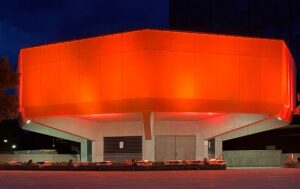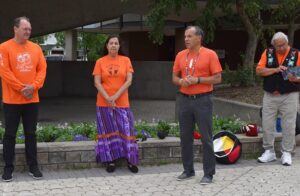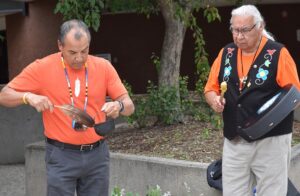North Bay City Hall lights up orange following solemn ceremony

By Kelly Anne Smith
NORTH BAY – A healing ceremony for the found children in unmarked graves at former Indian Residential School sites took place at North Bay City Hall on July 1.
North Bay Mayor Al McDonald, Executive Director of the North Bay Indigenous Friendship Centre Kathy Fortin, and George Couchie and Elder Peter Beaucage, both of Nipissing First Nation, took part in the solemn event.
North Bay Mayor Al McDonald called Deputy Mayor Tanya Vrebosh the driving force in lighting up the council chambers at City Hall orange on Canada Day to honour the children.
Kathy Fortin reached out to all to learn about Indigenous people.
“Learn about who we are and why we do things. But we are here for you. I just want you to know that the [North Bay Indigenous] Friendship Centre is always open,” she says. “The many days following the announcement of the graves of children that were found at Residential Schools, my heart’s been heavy. My eyes are full. Those were my nieces, my nephews, my aunts and my uncles that we found there.”
Since May, about 1,112 children have been found in shallow unmarked graves at three former Indian Residential School sites.

George Couchie says we have to acknowledge the trauma and the number of children found.
“Those numbers are going to hit 50,000. We’ve been talking about this for the last 40 years about the number of children buried at the Residential Schools,” he explains. “Today, it’s about healing. How do we all come together as a community and all heal together? That is so important, not just for non-Indigenous but our own communities that are really still struggling with that trauma.”
Elder Peter Beaucage offered a prayer in both Anishnaabemowin and English.
“Aanii. I’m so honoured to be here today with this feather. I want to give acknowledgements to all of us human beings. It doesn’t matter what nation we are from. We will all heal together. We will all walk together and we say thank you, miigwech to our Creator, the great spirit, to give us guidance today, to give us strength.”
Couchie then smudged attendees at City Hall.
“A smudge is a cleansing of our mind and body – what we say and how we feel. It’s to begin a new day, begin a new life. And begin a new life for all of Canada.”
Couchie says education is so important – learning about the history and learning about Indian Residential Schools.
“I was with Sudbury Regional Police last week. There was a couple of people who said, ‘You know, I’m still embarrassed that I don’t know a lot about the history of the Residential Schools.’ That’s something that needs to come forward. Not only in families but in our schools, in our universities,” he says. “I have relatives that go to the University of Nipissing. And they said they are still struggling with Indigenous history and culture because it’s not written in books. That’s the problem. We need to start teaching it.”
Couchie and Mayor McDonald are planning to revive the 2017 Truth and Reconciliation Awareness Sessions.
“For Indigenous people, today is a celebration that we need to get out and talk about our history and our culture because people are watching now,” explains Couchie. “I was in Rat Portage (Wauzhushk Onigum Nation) near Kenora and there was a huge football field. There they were telling us that they had so many deaths at the residential school that the priest told them that they had to double up the coffins. An Elder said, ‘That’s what we were doing. We doubled the coffins.’ There were no markers there, same with up in Chapleau. Shallow graves with no markers on them.”

Couchie’s father was forced to attend the Spanish Indian Residential School.
“They were already defeated when they came back home,” he recalls. “We had lost a generation of songs and stories, music, even the foods were lost. And so now, we have to teach our young people in our communities all about the things that were lost… Especially in Nipissing here, we’re still close to North Bay; within the last two years we’ve lost 10 of our youth to drugs and alcohol.”
“As everybody is trying to learn about what has happened, we are still struggling with the trauma in our community,” he continues. “Trauma built on trauma. And trauma isn’t just about the bad things that have happened to you. But it’s also the good things that didn’t happen to you… We’ve got a lot of young strong youth in our community that are out there trying to learn about their own culture. Their language is so important to what is their connection.”
Change is coming says Couchie. He tells Indigenous people, we have to make that change also.
“We need to change the conversations that are happening at the supper tables. There needs to be a positive ripple effect. We look at the residential schools, that was a negative ripple effect. How do we make that positive ripple effect in our communities? By starting off just with our own families and having those conversations of the news that’s coming out. I know how tragic it is but we need to really look at how we make it positive… For Indigenous communities, our goal now is about healing. We need to heal quickly before we lose any more of our youth.”
For non-Indigenous communities, Couchie says to get out there.
“If there is a ceremony, take part in the ceremony. Try to understand what the ceremony is. And open your hearts.”
On July 1, the Anishinabek Police Service shared the following video by Ed Regan video.


